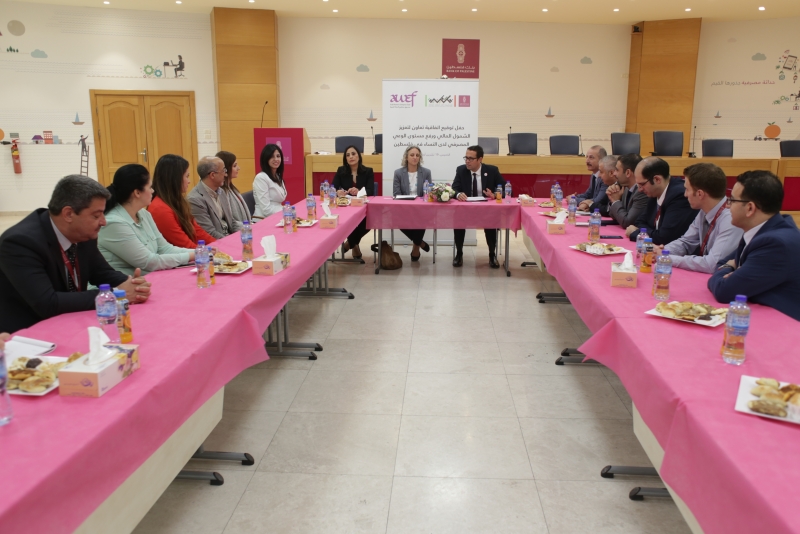
Bank of Palestine signed an agreement with the Arab Women’s Enterprise Fund to raise banking awareness and spread the importance of Palestinian women’s access to banking services. The signing ceremony was recently held at the bank’s main headquarters in the city of Ramallah between Mr. Hashim Al Shawa, the Chairman and General Director of Bank of Palestine, and Mrs. Nandi Hall, Principal Project Manager at the Arab Women’s Enterprise Fund in the Middle East, in the presence of Mrs. Safa Madi, AWEF Program Director in Palestine, and several program officials, with the participation of representatives and assistants to the General Director of Bank of Palestine and heads of departments.
In accordance with this agreement, the bank will work in partnership with the Arab Women’s Enterprise Fund to find ways to reach women and business entrepreneurs who work independently and as freelancers, to enable them to access banking service, and assist them in preparing plans to solve their daily problems. The agreement also aims to promote awareness and provide banking services to women living in remote areas away from service centers. Together with AWEF in Palestine, the bank will organize several activities, among them workshops, to promote awareness about the importance of activating women’s businesses and promoting their self-confidence in the ability to create an economy that proves locally capable and effective. This endeavor also aims to spread awareness among women about banking services offered by the Palestinian market. Several meetings will be organized in the form of women’s focus groups in order to identify the problems confronted by women and find opportunities to overcome challenges. The program aims to reach approximately 800 women who work alone and away from services provided by the banking sector, or those who work in micro projects from their homes.
Upon signing the agreement, Mr. Hashim Al Shawa, the Chairman and General Director of Bank of Palestine, stressed the importance of the partnership with the Arab Women’s Enterprise Fund in Palestine. He stated that when it comes to women, the bank shares the same goals with AWEF, and this is what will strengthen the partnership and further empower Palestinian women so that they are able to play a substantial and regulated role in the Palestinian economy and society. At the same time, Al Shawa pointed out that the bank has been working for years to achieve initiatives that enable Palestinian women to access the business and economic world, raise their awareness and ensure their access to banking services, which will in turn promote their economic presence, and hence contribute to building a sustainable economy that includes the participation of various groups in society.
Al Shawa stated that during the past few years, the bank has been exerting great efforts to provide untraditional financial service to businesswomen, project owners and entrepreneurs in order to achieve financial inclusion, which will in turn have a positive impact on the economy and society in general. Al Shawa added that the bank will not be able to achieve its goals and objectives without these partnerships that link it with local and international organizations. Such partnerships and relationships, according to Al Shawa, allow the bank to move away from traditional practices with an aim to gain as much expertise as possible and benefit society as a whole.
Mrs. Nandi Hall, Principal Project Manager at the Arab Women’s Enterprise Fund in the Middle East, expressed her enthusiasm about this new partnership with Bank of Palestine, which, according to her, will definitely lead to achieving the planned objectives. Hall pointed out to the experience of the program in some Arab countries to develop the economic role of women, whereby it was implemented in Egypt and Jordan and proved to be a big success and managed to achieve positive developments in partnership with Master Card International.
Hall added that the program managed to reach hundreds of women in the aforementioned countries, and was able to seek solutions for those who are part of a non-regulated work environment, enabling them to access banking service and register their projects in relevant organizations, so that their production is registered in the country’s GDP. These women also managed to develop their businesses, expand and promote their success, which is “a great thing”, according to Hall.